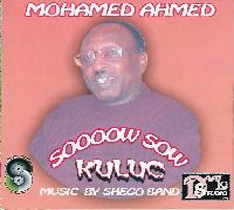Comprised of some of Addis Ababas finest acoustic musicians, the Addis Acoustic Project brings forth Ethiopias popular tunes from the 1950s and 1960s in a new light. Directed and arranged by guitarist Girum Mezmur, the Addis Acoustic Project unfolds vintage Ethiopian music in a fresh and contemporary way. The groups musical style has influences of traditional East-African, Jazz, and Afro-Caribbean rhythms among other styles.
Addis Acoustic Project - Live at Jazzamba
August, 2012 - "Meche Dereshe"
The band, composed of veteran musicians such as Ayele Mamo (Mandolin), as well as contemporary musicians such as Girum Mezmur (Guitars, Accordion), Henock Temesgen (Double Bass), Nathaniel Tesemma (Drums, Percussions), Aklilu Wolde Yohannes (Clarinet, Flute), and Misale Legesse (Kebero, Percussions), produces unique sounds dear to most Ethiopians and that undoubtedly appeal to a greater world music audience.
Addis Acoustic Project presents its performance with an attempt to stay true and authentic to the styles as well as instrumentations of the 1950s Ethiopian popular music, yet introducing fresh and contemporary musical elements with ample room for spontaneity and improvisation.
Addis Acoustic Projects founder/ musical director, Girum Mezmur, has performed with the whos who of Ethiopian music including Aster Awoke, Ali Birra, Mahmoud Ahmed, Alemayehu Eshete, and Teddy Afro. His musical relationship with Mahmoud Ahmed has provided him the opportunity to tour several countries worldwide including Africa, Europe, and Canada, playing at major international music festivals such as the WOMAD, the Montreal Jazz Festival, Roskilde Festival, etc. Girum has also had the honor of participating in U.Ks 2007 BBC Radio World Music Award, appearing as Mahmoud Ahmeds guitarist. It was here where Mahmoud Ahmed won the nomination for Best Artist under the category Africa. Girum has also performed / recorded with other renown African artists such as Angelique Kidjo, Ray Lema, and Ali Keita. Girum Mezmur is also a co-founder of Jazzamba Music School and Jazzamba Lounge, as well as the yearly Acacia Jazz & World Music Festival in Addis Ababa.
Since its premiere at the 7th Ethiopian Music Festival (May 2008), the Addis Acoustic Project has been enjoying great success. The group currently performs on a weekly basis at one of Addis Ababas hip jazz spots..."Jazzamba Lounge".
The band has also performed internationally at renowned festivals and venues such as WOMEX09 in Copenhagen, Selam Festival in Stockholm, TFF Rudolstadt Festival in Germany, Tree House in Nairobi, Sauti za Busara Festival in Zanzibar, and MASA in Ivory Coast among others.
The band released its debut album "Tewesta"- Remembrance" on the world music label, Harmonia Mundi/World Village in August 2011.
Addis Acoustic Project - Live at Jazzamba 01 [Ethiopia](Addis Abeba) (4:57)
Addis Acoustic Project - Live at Jazzamba 02 [Ethiopia](Addis Abeba) (3:58)
Addis Acoustic Project - Live at Jazzamba 03 [Ethiopia](Addis Abeba) (0:35)
Addis Acoustic Project - Live at Jazzamba 04 [Ethiopia](Addis Abeba) (3:24)
Addis Acoustic Project - Live at Jazzamba 05 [Ethiopia](Addis Abeba) (4:54)
Addis Acoustic Project - Live at Jazzamba 06 [Ethiopia](Addis Abeba) (5:42)
Addis Acoustic Project - Live at Jazzamba 07 [Ethiopia](Addis Abeba) (4:13)
Addis Acoustic Project - Live at Jazzamba 08 [Ethiopia](Addis Abeba) (5:57)
Addis Acoustic Project - Live at Jazzamba 09 [Ethiopia](Addis Abeba) (6:31)
Addis Acoustic Project - Live at Jazzamba 10 [Ethiopia](Addis Abeba) (5:11)
Addis Acoustic Project - Live at Jazzamba 11 [Ethiopia](Addis Abeba) (9:53)
Addis Acoustic Project - Live at Jazzamba 12 [Ethiopia](Addis Abeba) (4:41)
Addis Acoustic Project - Live at Jazzamba 13 [Ethiopia](Addis Abeba) (11:29)
Addis Acoustic Project - Live at Jazzamba 14 [Ethiopia](Addis Abeba) (4:25)
Addis Acoustic Project - Live at Jazzamba 15 [Ethiopia](Addis Abeba) (9:01)
Addis Acoustic Project - Live at Jazzamba 16 [Ethiopia](Addis Abeba) (6:50)
Addis Acoustic Project - Live at Jazzamba 17 [Ethiopia](Addis Abeba) (7:57)
Addis Acoustic Project - Live at Jazzamba 18 [Ethiopia](Addis Abeba) (7:23)
1:47:01 - 147 mb @ 192 kbps
bootleg quality
bootleg quality



















